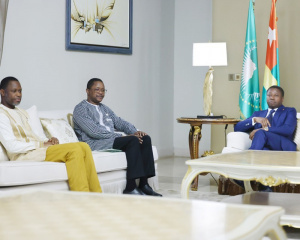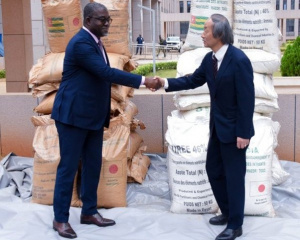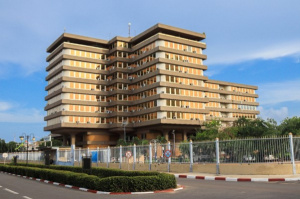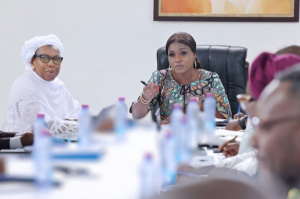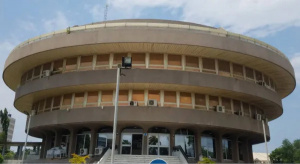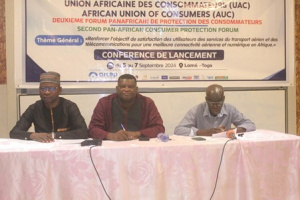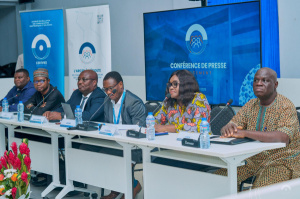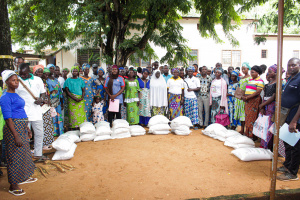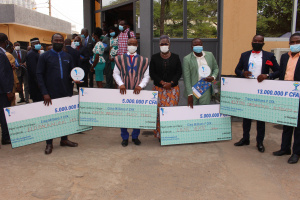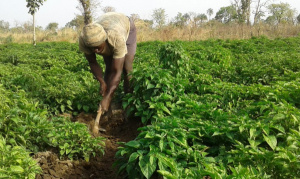Togo First
Cooperation: Niger and Burkina Faso Take New Steps to Get Closer to Togo
The Togolese President, Faure Gnassingbé, recently recently two delegations from Niger and Burkina. He first received the delegation from Burkina Faso, on August 9, and the one from Niger on August 12.
Both delegations were in Lomé to discuss ways to bolster diplomatic relations and cooperation with Togo.
The Niger delegation was led by the Minister of Public Health and Social Affairs, Colonel Major Garba Hakimi. "We have just been received by His Excellency, Faure Gnassingbé. This is a mission dispatched by his brother, Brigadier General Abdourahamane Tiani, from the Republic of Niger. The main purpose of the mission is to deliver a message from the President of Niger,” Hakimi said after the meeting.
The group from Burkina Faso was led by the Minister of Foreign Affairs, Karamoko Jean Marie Traoré. "The President of Faso, Captain Ibrahim Traoré, has mandated us to reaffirm his message of fraternity and solidarity, as well as the positive appreciation of the Togolese President's leadership on sub-regional issues," said after meeting with President Gnassingbé.
The meetings happen in a difficult socio-economic and political context in the region. Indeed, Burkina Faso, Niger, and Mali have left the ECOWAS block in recent months to form the Alliance of Sahel States (AES). The Sahel States and the northern part of Togo are also facing security issues.
Though they left the ECOWAS, the AES States seek to get closer to Togo, which they want to involve in their customs interconnection project. If implemented, the project will bolster Togo's position as an entry point for products imported by its landlocked neighbors.
Ayi Renaud Dossavi
Japan Gives Togo CFA2 Billion Worth of Fertilizer
Togo received 5,066 tons of fertilizer from Japan on August 13. The Asian nation donated the shipment, valued at CFA2.2 billion, to support Togo’s 2023 Economic and Social Development Program.
The Togolese Minister of Agriculture, Antoine Lekpa, received the shipment from the Japanese ambassador, Ikkatai Katsuya.
In detail, 3,295 tons of NPK15-15-15 and 1,771 tons of urea were sent. These will be handed over to small farmers–rice farmers primarily–across the country.
The donation aims to reduce rice imports and boost agricultural production overall.
Besides the donation, Japan signed a new food aid agreement with Togo. Under the deal, Japan will send CFA1 billion rice shipments to Togo. The agreement falls under the 2024 Kennedy Round Program (KR).
Since 2008, Togo, under the Kennedy Round (KR) program, has received 114,692 tonnes of cereals, including 81,849 tonnes of wheat and 32,843 tonnes of white rice. The shipments are valued at around CFA24.5 billion.
The KR Program aims to "improve the food and nutritional security of populations, especially the most vulnerable."
Esaïe Edoh
WAMU Securities: Togo Raises CFA32.7 Billion in Latest Issue
Togo raised CFA32.7 billion on the West African Monetary Union (WAMU) public securities market last Friday, August 9. That is CFA2.7 billion more than its target for the operation.
According to the operation’s report, CFA27.3 billion was secured through fungible treasury bills (BATs). The securities mature over 182 days and 364 days.
The remaining CFA 5.4 billion, according to the same source, was obtained through fungible treasury bonds (OATs), which mature over five years at 6.40% per annum.
Togo will use the proceeds to finance its 2024 budget. The latter totals CFA2,179 billion in revenues and expenses.
Adding the latest issue, Togo has raised CFA 563 billion on the WAMU market so far this year, 92% of its annual target–CFA607 billion.
Esaïe Edoh
Child Protection: Togo Records Significant Progress with UNICEF Support
Lomé hosted last Friday a meeting between Togolese authorities and a UNICEF delegation. The meeting was co-chaired by Sandra Ablamba Johnson, Minister Secretary General of the Presidency, and Aissata Ba Sidibé, UNICEF Resident Representative. The various sides reviewed their cooperation.
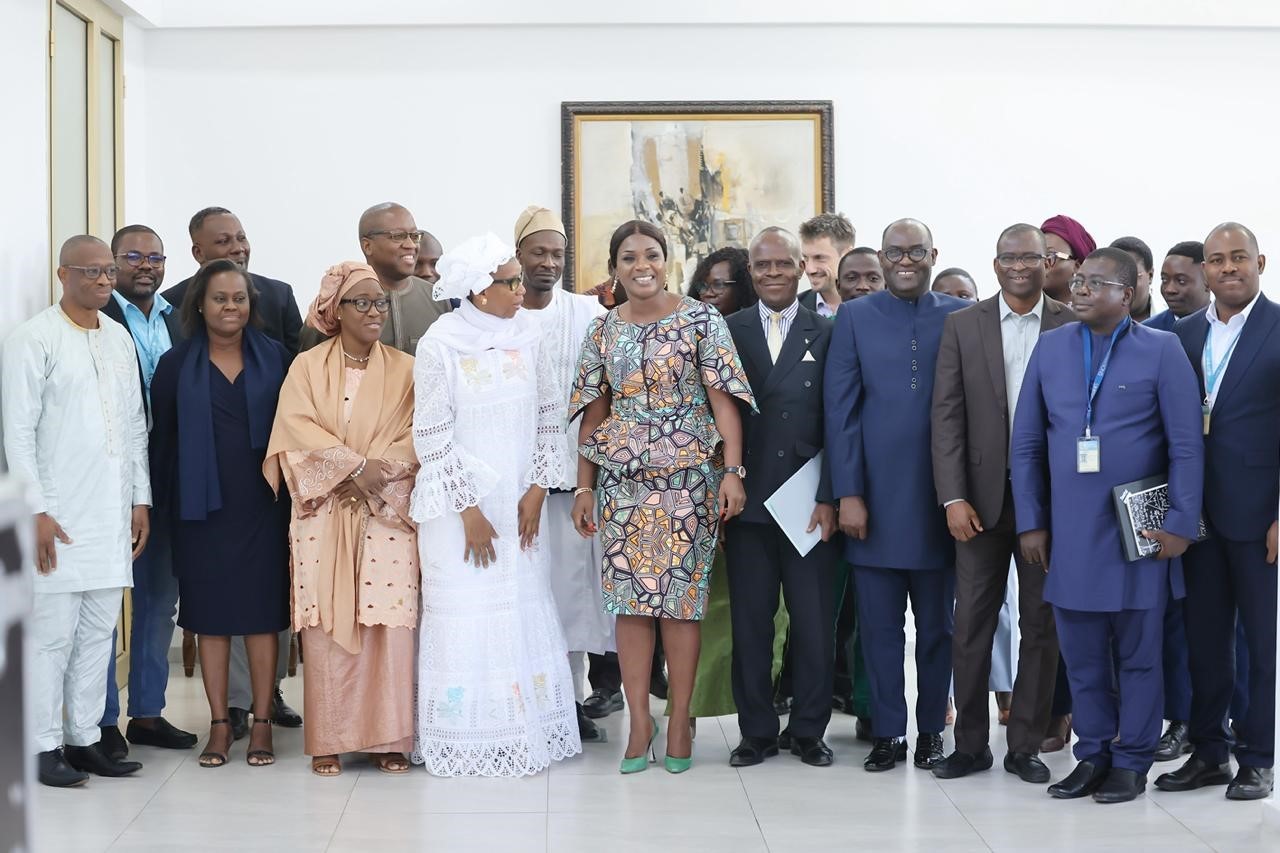
The participants discussed UNICEF's key initiatives in Togo across various sectors. In health, for example, they found that Togo maintained a Penta 3 vaccine coverage rate above 90%, despite challenges from the Covid-19 pandemic.
Nous avons tenu le vendredi 09 Août 2024, une séance fondamentale avec l'#UNICEF afin d’évaluer et renforcer notre coopération en matière de protection et promotion des #droits de l'#enfant au Togo.
— Sandra ABLAMBA JOHNSON (@SandraA_JOHNSON) August 11, 2024
Cette rencontre marque un tournant décisif dans notre engagement commun ⤵️ pic.twitter.com/X0kMT3Rz1w
In hygiene and sanitation, the West African country has made progress in reducing open defecation. Thanks to the "Togo SANDAL by 2030" initiative, supported by UNICEF, 624 ecological and biogas latrines were built in rural areas. This helped reduce open defecation by nearly 10 points.
Other UNICEF-backed projects to combat violence against children have also been implemented, with 3,730 teachers receiving training. Also, from 2018 to 2022, birth registration for children under 5 went from 79.2% to 86%, spurred by the Togo-UNICEF partnership.
The two partners recently launched a new cooperation program for 2024-2026, with a budget of 30 billion FCFA. The program will focus on five key areas: child survival, education and development, child protection, social policies, and program effectiveness.
Esaïe Edoh
WAEMU Securities: Togo Closes Latest Operation Today
Togo is closing its latest operation on the West African Economic and Monetary Union (WAEMU) securities market today. Lomé hopes to raise CFA30 through the operation.
In detail, the country’s treasury simultaneously issued fungible bonds (OATs) and bills (BATs). Lomé seeks CFA10 billion through the BATs and CFA20 billion through the OATs. The former securities have a par value of CF1 million, and mature over 182 days, at multiple rates. The latter have a par value of CFA10,000, mature over one and five years. The one-year securities have various interest rates and the five-year securities have a fixed rate of 6.40%.
Proceeds of the operation will fund Togo’s 2024 budget which stands at CFA179 billion. Togo has raised CFA531 billion on the regional market since January, out of an annual target of CFA607 billion.
Esaïe Edoh
Togo to Host 2nd Pan African Consumer Protection Forum Next Month
Togo will host the second Pan-African Consumer Protection Forum next month. This event will take place from September 5 to 7, in Lomé, the capital. It is organized by the African Consumers' Union (ACU) in partnership with the Ligue des Consommateurs du Togo (Consumers’ League of Togo - LCT).
This year, the event’s theme is: "Strengthening the satisfaction of users of telecommunications and air transport services for better air and digital connectivity."It aims to get ACU members to develop strategies for rapidly implementing the Single African Air Transport Market (SAATM) and improving telecommunications regulation across Africa.
Dr. Emmanuel Sogadji, President of the LCT, said "The forum will bring together representatives of consumer organizations from all over Africa. The UAC aims to strengthen the bond of partnership and fraternity within these organizations. We have put in terms of general theme the protection of consumer rights in the telecommunications and air transport sectors."
Talks, he added, will also cover ways to encourage countries to ratify SAATM, which would help facilitate the free movement of people and goods across Africa. "Taxation will also be on the discussion menu. We'll be talking about telecommunications, which today are the basis of all economic activity in our countries, as well as our businesses," he said.
Founded in 2018 and based in N'Djamena, Chad, the ACU includes 43 consumer associations from 34 African countries.
Ayi Renaud Dossavi
Togo: Telecom Watchdog Prepares for Nationwide Awareness Campaign
Togo’s telecom watchdog, ARCEP, will go on a nationwide tour from August 8 to 23, 2024. During the campaign, the regulator will inform consumers about their rights and responsibilities with communication operators. The news was disclosed on August 5 at a press conference in Lomé.
During the tour, consumers will learn about the ARCEP’s role in regulating communication services. The consumers will also be able to share their concerns and file complaints on the spot. They will learn how to file complaints and assert their rights. Together with ARCEP workers, managers from mobile operators, including Moov Africa-Togo and Togocom, will answer and address consumers’ questions and concerns.
The tour will also include meetings between the regulator and local authorities to discuss partnerships between operators and municipalities, focusing on administrative procedures.
According to the ARCEP, the upcoming tour "will undoubtedly help improve the quality of services offered and foster a regulated environment beneficial to all."
Esaïe Edoh
Togo: FRSP Runs Seeds Distribution Campaign in Maritime Region
The West African Food System Resilience Program (FSRP Togo) recently launched a certified seeds distribution campaign in the Maritime region. Last Thursday, the program covered several localities, including Afagnan, Momé-Hagou, and Tabligbo.
Implemented in partnership with the Institut de Conseil et d'Appui Technique (ICAT), the FSRP Togo provides quality seeds to vulnerable farmers, hence helping improve their yields.
Sewonou Yao, head of ICAT Maritime's extension service, noted that "obtaining a good yield depends 40% on the quality of the seeds." He added that following proper agricultural practices could help yield 2.5 tonnes per hectare for maize, 333 kg per hectare for rainfed rice, and 6 tonnes for irrigated rice.
The distribution campaign is part of a nationwide effort to assist nearly 30,000 vulnerable producers in the Kara, Centrale, Plateaux, and Maritime regions. Under this larger initiative, each farmer will receive a 10 kg bag of certified seeds, including enhanced organic corn, rice, soybean, and cowpea.
Financed by the World Bank, the FSRP Togo aims to strengthen the country's food and nutrition system by improving agricultural yields, developing farm mechanization, and increasing access to agricultural inputs
WAEMU: Third Edition Startup Tremplin Contest Is On
The WAEMU Startup Tremplin Contest is on. Startups in the WAEMU have until August 20 to apply.
This year, the competition targets startups active in the cultural and creative industries. These include film and audiovisual, music, performing arts, publishing, visual arts, arts and crafts, design, fashion, and video games.
At the national level, the three best startups will receive incentive prizes of 6 million, 5 million, and 4 million CFA francs, respectively. Incubators supporting any winner could also receive CFA1 million CFA francs each as an incentive prize.
At the regional level, prizes of excellence ranging from 10 to 15 million CFA francs will be awarded to the five best startups in the UEMOA region.
This year's edition–the third edition–is organized in partnership with the WAEMU Regional Consular Chamber (CCR-UEMOA) and, at the national level, the Togo Chamber of Commerce and Industry (CCI-Togo). The contest is promoted by the WAEMU Commission.
Applications have been open since July 19.
Check the full regulation to apply here.
Ayi Renaud Dossavi
IFAD Backs Togolese Agriculture with $2.4M Funding
Togo recently secured $2.4 million from the International Fund for Agricultural Development (IFAD) to develop its agricultural sector. The deal was sealed last week in Lomé, by IFAD’s country director, Kabore Jean Pascal, and Ayéfoumi Olou-Adara, president of the Coordination togolaise des organisations paysannes et de producteurs agricoles (CTOP).
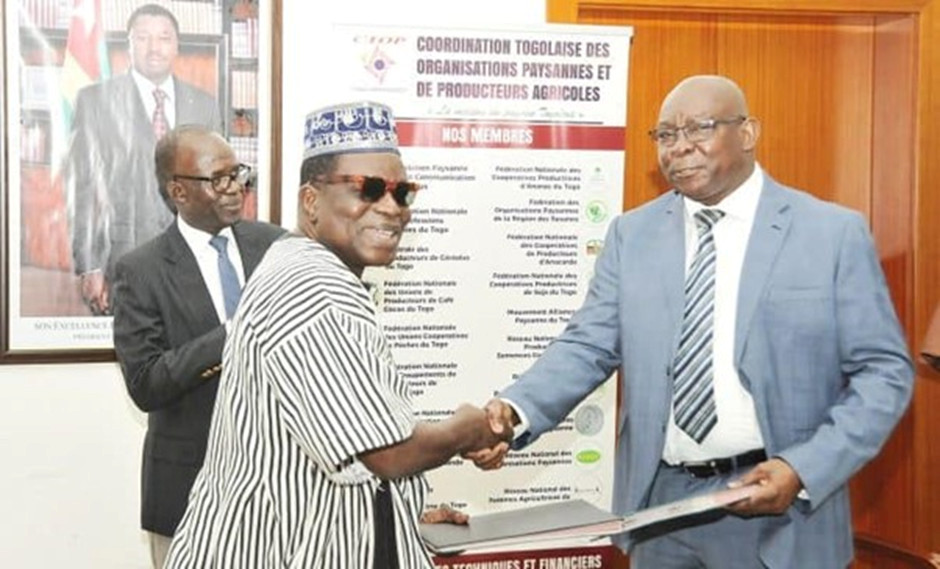
The funding will help implement the Projet soutien à la promotion du maraîchage agro écologique paysan au Togo (ProsMAT). Togo will use the money to finance its food security strategy and foster sustainable farming practices.
Through the ProsMAT, CTOP will provide technical support to market gardeners in 16 prefectures across six agricultural regions, focusing on agroecological production. The goal is to improve vegetable yields and quality while reducing pollution.
The project will also work on reducing post-harvest losses and helping market agroecological produce. Additionally, the funding will support processing units run by women's cooperatives and youth enterprises producing agroecological inputs.
The project should last 40 months and cover about 10,000 farmers, with 58% being women. The initiative is part of other IFAD efforts to support Togolese agriculture, including funding for a project aimed at achieving zero hunger in Nigeria and Togo.
Esaïe Edoh

